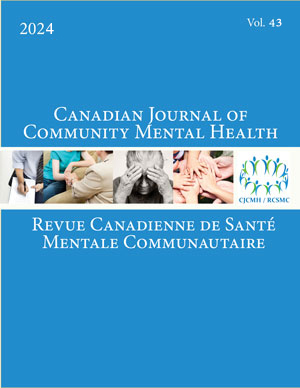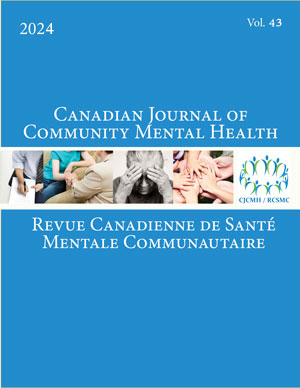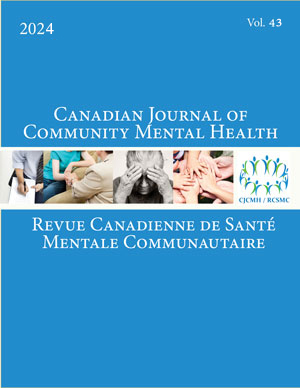Volume 38 • Number 4 • December 2019
Articles
OPEN ACCESS
Practitioners in emergency departments across Canada are challenged with providing quality mental health (MH) care for children and youth despite increased demand for services. Coordinated service strategies, such as clinical pathways, are needed to effectively manage paediatric MH disorders. Practitioners in a children’s hospital emergency department implemented a pathway to improve the care of children and youth with MH conditions. This paper describes an external evaluation of practitioner and stakeholder experiences of the initiative as well as the implementation process, then explores current state and lessons learned. The paper provides a unique contribution to the practitioner-led implementation literature.
OPEN ACCESS
Research into social determinants of mental and emotional health problems highlighted the need to understand the cultural factors. Mental health of immigrants is influenced by a variety of cultural, psychological, social, and economic factors. There is some evidence to suggest that South Asian people have higher rates of mental and emotional health problems than the rest of the Canadian population. Limited research also suggests that psycho-social factors are highly likely to be responsible for these high rates of mental health problems. These psychosocial factors may be impeding access and engagement with the services. These socially determined emotional and mental health problems are more likely to respond to psychosocial interventions than biological treatments. Evidence-based psychosocial interventions such as Cognitive Behaviour Therapy (CBT) and Acceptance and Commitment Therapy (ACT) might offer the way forward. CBT can be offered in a low-cost, low intensity format in a variety of settings, thus addressing the attached stigma. However, these interventions need to be culturally adapted, as these are underpinned by a Western value system. CBT has been culturally adapted and found to be effective in this group elsewhere. This opinion paper describes the need to enhance research on psychosocial determinants of the mental and emotional health problems, status, and the psychosocial determinants of health amongst South Asians in Canada to inform our understanding of the cultural specificity of psychosocial interventions.
OPEN ACCESS
Il est reconnu que l’intervention intégrée fait partie des meilleures pratiques auprès des personnes présentant un trouble psychotique en concomitance avec un trouble de l’utilisation des substances (TUS). Une telle intervention a été développée dans la région de Chaudière-Appalaches (Québec) afin de favoriser le rétablissement des personnes aux prises avec ces troubles concomitants. Cet article présente l’évaluation des retombées de la participation au programme pour les usagers. Les résultats indiquent qu’un an après avoir débuté, ils ont diminué leurs visites à l’urgence, leurs hospitalisations et leur consommation de substances et ont amélioré leur santé psychologique et leur qualité de vie.
OPEN ACCESS
Recovery is a policy framework for mental health in Canada. Key challenges to the integration of recovery include a gap in knowledge about the work that people do to promote their health and well-being in the context of living with mental ill health. This study used Photovoice to explore the lived realities of people living with mental ill health and the impact of the social determinants on their recovery process. Findings from this study inform policy and practice on promoting health work as an important dimension of recovery and community inclusion.
OPEN ACCESS
De nombreux témoignages de femmes rapportent des expériences de détresse, de souffrance ou de violence lors de l‘accouchement, nommées « violence obstétricale » par les groupes de défense de droits en périnatalité. Or, les écrits mentionnent peu les perceptions des intervenantes en périnatalité confrontées à cette problématique. Par le biais de groupes de discussion auprès d‘intervenantes communautaires en périnatalité au Québec (n = 29), cette étude documente leurs représentations de situations de violence obstétricale, les difficultés qu‘elles rencontrent et leurs stratégies d‘intervention. Les résultats contribuent à une meilleure compréhension de cette forme de violence et à une réflexion sur les efforts à fournir pour favoriser le bien-être des femmes durant la période périnatale.
OPEN ACCESS
Malgré l’offre de soins de santé mentale dans les soins primaires, la fragmentation des soins de santé mentale et physique demeure. Cet article analyse des modèles de prise en charge qui permettraient une globalité des soins, et fonde ses résultats sur 7 études de cas d’équipes multidisciplinaires reposant sur une pratique infirmière élargie au Québec, ainsi que sur des entrevues avec des professionnels de la santé (n = 51). Les résultats démontrent que les rôles demeurent cloisonnés suivant une dichotomie santé mentale et physique, et ce, malgré la composition multidisciplinaire des équipes. Ils indiquent également l’existence d’un rapport inversement proportionnel entre la complexité des situations de soins et le nombre de professionnels impliqués.
OPEN ACCESS
This paper explores the role of an innovative trauma-informed, strengths-based education program designed to address barriers to education about the self-esteem and well-being of survivors of torture and/or war. Results show a statistically significant change in participants’ self-esteem measures. Qualitative data suggest that the participants perceived the program as a safe space that afforded social support and factual information about access to tertiary education. The program also reinforced participants’ sense of belonging and helped sustain their feelings of hope and motivation. Trauma-informed, strengths-based educational programming is a promising framework that can support survivor’s self-esteem, sense of identity, and successful resettlement.
OPEN ACCESS
Les difficultés fonctionnelles, le faible statut socioéconomique et l’isolement social font partie des facteurs qui influencent les choix alimentaires des personnes ayant un ayant un trouble mental grave. Quelles sont les difficultés rencontrées par les personnes atteintes de troubles mentaux graves concernant l’alimentation ? Cet article présente les résultats d’entrevues de groupe auprès de 23 participants atteints d’un trouble mental grave et à risque d’insécurité alimentaire. Cette étude vise à documenter la perception de ces personnes à l’égard de leur situation alimentaire afin de décrire cette réalité et en permettre une compréhension approfondie. L’analyse qualitative des données d’entrevue permet d’identifier 4 grands thèmes explicatifs.










